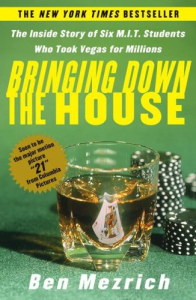The inside story of six MIT students who took Vegas for millions
Overview

When it comes to stories, we all love a good underdog. There’s no denying that as a society, we can’t help rooting for the little guy. We love the guy who gets pushed around by the bullies but isn’t scared to push back. We cheer for the guy who refuses to let the bad guys claim victory, no matter how much bigger, scarier, or more powerful they are. But there’s something we love even more than cheering for the underdog. After all the hardships he’s endured, we love watching him finally kick ass. And that’s what makes Ben Mezrich’s nonfiction novel, Bringing Down the House: The Inside Story of Six MIT Students Who Took Vegas for Millions, so damn good. The underdog in this story: six socially awkward college geniuses who rake in millions of dollars doing what the little guy does best – outsmarting the giant.
From Remember the Titans to The Karate Kid, The Lord of the Rings to Harry Potter – the best part of the underdog story is when the little guy finally has his day, defeating the odds and the enemy to claim sweet, sweet victory. When David beats the giant Goliath with a slingshot, it’s pure magic.
Beating the house at Blackjack
Back in the late 1980’s and early 1990’s, blackjack was in the middle of its heyday. Casinos around the US were raking in money on the game, and it was easily the most played casino game of any on offer. Folks heard it could be beaten from people like Edward O. Thorp, another MIT guy who wrote the famous book Beat the Dealer in the 60’s, which detailed the hi-lo method of card counting for blackjack. And the casinos made money off this thinking. They profited off those who thought it could be beaten but weren’t honestly capable of pulling it off, and not to an extent that was noticeable.
But Micky Rosa, a professor at MIT, knew that beating the casinos wasn’t only possible, it was an extremely lucrative venture that hadn’t been exploited to its fullest potential. So, Rosa formed a blackjack team of six MIT students and trained them to count cards and operate like a well-oiled machine. All with the goal of infiltrating the Las Vegas strip and earning millions playing the system. Like in all good underdog stories, the little guy would take down the big, bad, giant.
My personal thoughts
Mezrich’s bringing down the house book is excellent, from the first page right until the back cover. The story itself is a fantastic one. But Mezrich delivers everything in sharp focus, and brings a real human element to card counting, which was often associated with unsavory types before his novel was written. He shows readers that these weren’t criminals robbing businesses blind. These were young, privileged and well-educated adults taking advantage of a completely legal opportunity.
Before reading BDTH I knew next to nothing about card counting. But Mezrich aptly explains what it is and how and why it works. He made me believe that card counting isn’t only possible, it’s extremely profitable if you can pull it off. I fell into the trap – while reading I often thought, “The basic strategy involved seems relatively easy. Why aren’t I doing this right now?”. Granted, blackjack has changed a lot since the MIT blackjack team was making bank. With the adoption of automatic shufflers and rules like “no surrender” and a six-to-five payout, card counting is much harder to pull off. Still, it was an interesting thought. I wouldn’t mind throwing a few chips around and walking away with extra money in my pocket, though it certainly wouldn’t be millions.
The card counting conundrum
And Mezrich’s book effectively combats negative connotations associated with card counting. This is all completely legal! Sure, it’s frowned upon, and those guys on the blackjack team had some scary experiences with people tasked with protecting the casinos’ interests. But in Las Vegas it isn’t a crime to count cards. So, young students and professionals like Rosa’s blackjack hit Vegas on the weekends, raked in hundreds of thousands counting cards, and then flew home to a normal life in Boston on Monday morning. Which is exactly what they did for several years.
The Robin Hood Shtick
Now, while the whole story is incredible and impressive, I didn’t buy the “Robin Hood” shtick some of the characters tried to sell. I grew up in Nevada. So I’m well aware that when you enter a casino looking to gamble, you’re paying a business to provide a service. Casinos are a business that provides entertainment. They wouldn’t exist if they didn’t make money off people, so obviously they’re going to have the advantage. The story of casinos isn’t one of the rich stealing from the poor. It’s a business making money off of people willing to spend it.

And the blackjack team members didn’t qualify as Robin Hood types, anyway. Sure, they were college students “fighting” against the wealthy corporate casinos. But they were also MIT geniuses destined for careers on Wall Street or boutique financial firms in Boston or Chicago or New York, complete with cushy corner offices. And they certainly weren’t counting cards in the name of public charity.
It’s a romantic notion, but let’s not classify it as something it’s not. It was a well-executed, totally legal, and ridiculously badass get-rich-quick scheme that seriously worked. As Mike Aponte, aka Jason Fisher, said in the interview at the end of the novel, “We were a determined, organized group that used mathematics and ingenuity to turn blackjack into a lucrative entrepreneurial venture.” Doesn’t really sound like Robin Hood and his merry men to me.
The bottom line
I highly recommend Bringing Down the House to pretty much anyone. Especially for those who want a nonfiction, highly entertaining “beat the dealer” story. Pick this one up and I guarantee, you’ll feel like a high rolling MIT nerd in no time. And after you read it, try your hand at Blackjack at Planet 7 Casino.





